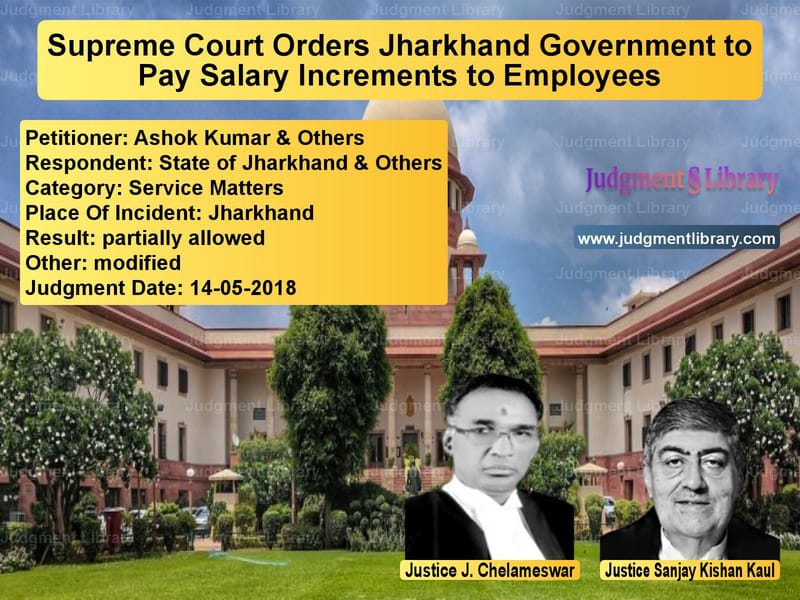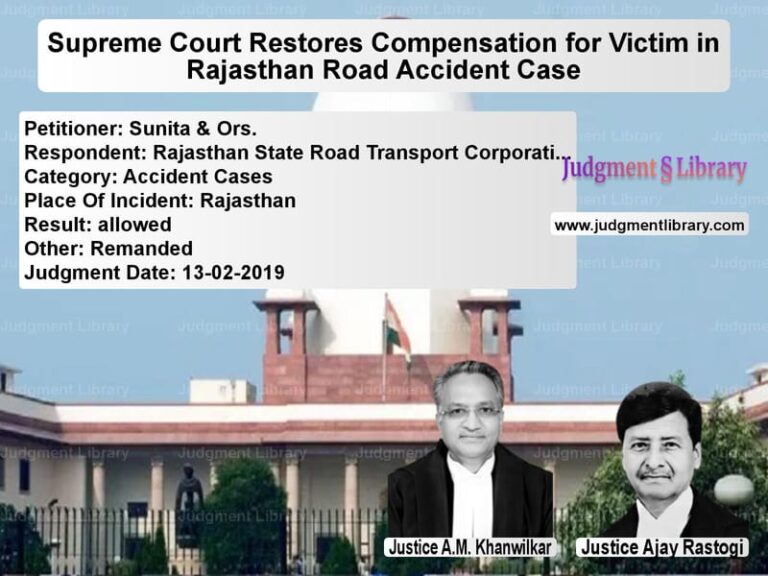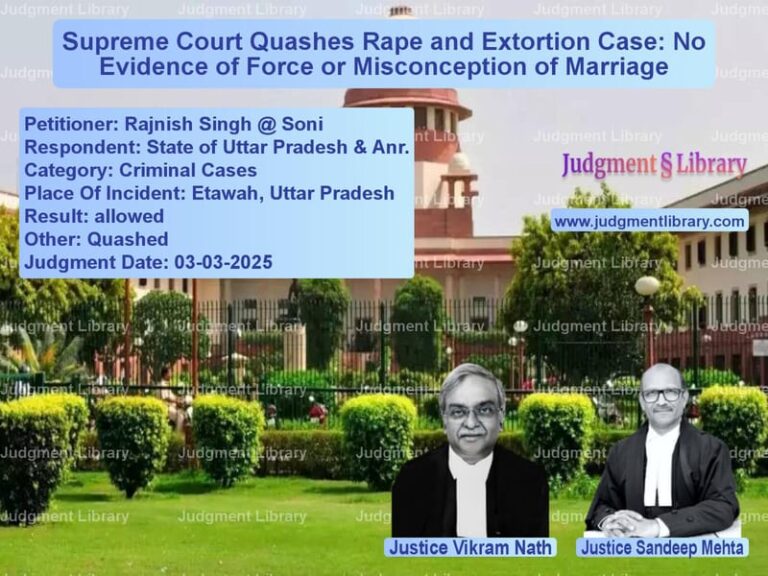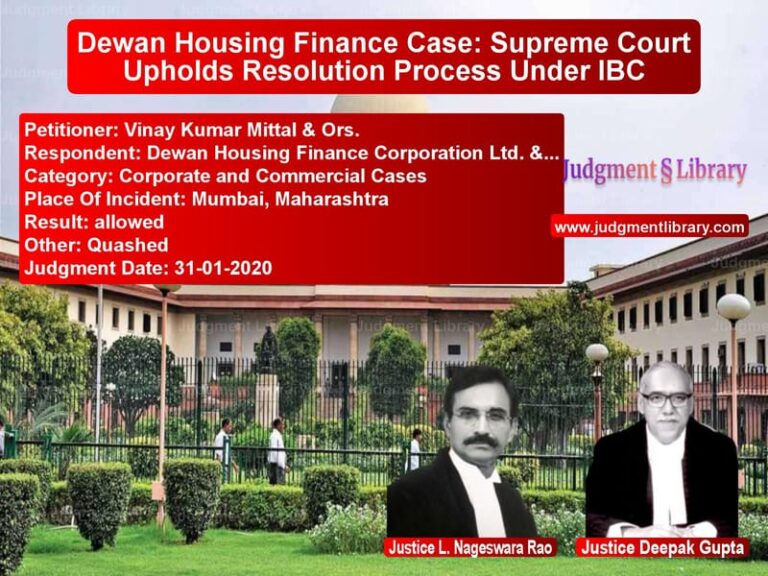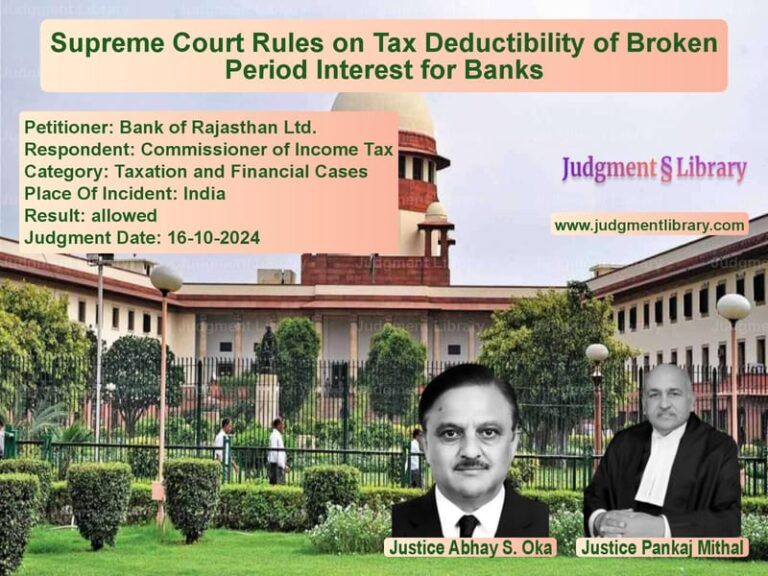Supreme Court Orders Jharkhand Government to Pay Salary Increments to Employees
The case of Ashok Kumar & Others vs. The State of Jharkhand & Others revolves around the entitlement of government employees to salary increments and other financial benefits. The Supreme Court had to determine whether the petitioners were entitled to their due benefits and direct the state government to comply with service regulations.
Background of the Case
The petitioners, Ashok Kumar and others, were employees of the Jharkhand government who had been denied their rightful salary increments and differential benefits for several years. The issue arose due to delays in government action and technical disputes regarding service records. As a result, the employees approached the courts seeking justice.
Earlier, on May 11, 2018, the Supreme Court passed a judgment directing the Jharkhand government to release the outstanding differential benefits to the employees. However, when the matter was mentioned again on May 14, 2018, the Court made certain modifications to its earlier order to ensure clarity and effective implementation.
Petitioners’ Arguments
The petitioners contended that:
- Denial of Legitimate Benefits: The state government had unfairly withheld their salary increments and differential benefits, violating service regulations.
- Violation of Fundamental Rights: The denial of financial entitlements amounted to an arbitrary action that affected their livelihood.
- Unequal Treatment: Other employees in similar positions had received increments, but the petitioners had been left out.
- Government’s Obligation: The state was bound by law to grant periodic salary increments and could not deny benefits due to bureaucratic inefficiencies.
Respondents’ (State of Jharkhand) Arguments
The Jharkhand government defended its position, arguing that:
- Budgetary Constraints: The state had been facing financial limitations, leading to delays in the disbursement of increments.
- Technical Errors: Some employees’ service records had inconsistencies, which needed to be verified before granting increments.
- Legal Clarifications Were Needed: The government sought modifications to certain directives issued in the May 11, 2018, judgment.
Supreme Court’s Observations
The Supreme Court, comprising Justice J. Chelameswar and Justice Sanjay Kishan Kaul, analyzed the matter and made key observations:
1. Deletion of Certain Directions
The Court ruled that some directions given in its earlier judgment were no longer necessary:
“On the matter being mentioned, the learned counsel for the parties stated that there may not be necessity of a direction as contained in paragraphs 25 and 26 of the judgment passed by this Court on 11.5.2018, which accordingly stand deleted.”
2. Clarification of Payment Order
To ensure clarity, the Court modified paragraph 27 to read:
“The respondent will ensure that the differential mandatory benefits including increments are remitted to the appellants within a period of three months from the date of the order.”
This explicitly directed the Jharkhand government to complete the payment process within three months.
Detailed Legal Analysis
The Supreme Court’s judgment reinforces several legal principles regarding government employees’ rights:
1. Right to Salary Increments
Salary increments are not discretionary but a statutory right for employees who meet service conditions. Denial of these increments violates established employment laws.
2. Government’s Obligation to Pay
State governments must ensure timely payment of wages and benefits to employees. Delays due to budgetary issues cannot override employees’ legal entitlements.
3. Equal Treatment Under Service Rules
The Court emphasized that all similarly placed employees should receive equal benefits. Arbitrary withholding of benefits from some employees is legally untenable.
4. Accountability for Delays
The Court held that employees should not suffer due to administrative lapses. Government departments must rectify service record discrepancies promptly and not use them as an excuse to withhold payments.
Final Judgment
The Supreme Court ruled:
- The modifications requested by the parties were accepted.
- The State of Jharkhand must pay all due salary increments and benefits within three months.
- The appeal was disposed of with no further clarifications needed.
The Court concluded:
“The order is modified to ensure timely payment of benefits without unnecessary procedural delays.”
Implications of the Judgment
This ruling has significant implications for government employees:
1. Strengthening Employee Rights
The judgment reinforces that government employees have a legal right to receive timely salary increments. Employers cannot arbitrarily delay or deny these benefits.
2. Fairness in Pay
The ruling ensures that all employees are treated equally and receive their lawful entitlements, regardless of administrative inefficiencies.
3. Government Accountability
The Supreme Court’s ruling holds state governments accountable for ensuring prompt payment of benefits. Governments must take proactive measures to prevent delays in salary disbursements.
4. Precedent for Future Cases
This case sets a legal precedent for other government employees facing similar delays in salary increments. Courts are likely to rely on this ruling when dealing with salary disputes.
Conclusion
The Supreme Court’s decision in Ashok Kumar & Others vs. The State of Jharkhand is a landmark ruling that protects the rights of government employees. By directing the state government to pay the differential benefits within three months, the Court ensures that employees are treated fairly and that their financial rights are upheld.
The ruling also underscores the importance of transparency in government service regulations and reaffirms that state authorities must comply with the law when handling salary increments and other financial entitlements.
Petitioner Name: Ashok Kumar & Others.Respondent Name: State of Jharkhand & Others.Judgment By: Justice J. Chelameswar, Justice Sanjay Kishan Kaul.Place Of Incident: Jharkhand.Judgment Date: 14-05-2018.
Don’t miss out on the full details! Download the complete judgment in PDF format below and gain valuable insights instantly!
Download Judgment: Ashok Kumar & Others vs State of Jharkhand & Supreme Court of India Judgment Dated 14-05-2018.pdf
Direct Downlaod Judgment: Direct downlaod this Judgment
See all petitions in Employment Disputes
See all petitions in Pension and Gratuity
See all petitions in Public Sector Employees
See all petitions in Judgment by J. Chelameswar
See all petitions in Judgment by Sanjay Kishan Kaul
See all petitions in partially allowed
See all petitions in Modified
See all petitions in supreme court of India judgments May 2018
See all petitions in 2018 judgments
See all posts in Service Matters Category
See all allowed petitions in Service Matters Category
See all Dismissed petitions in Service Matters Category
See all partially allowed petitions in Service Matters Category

